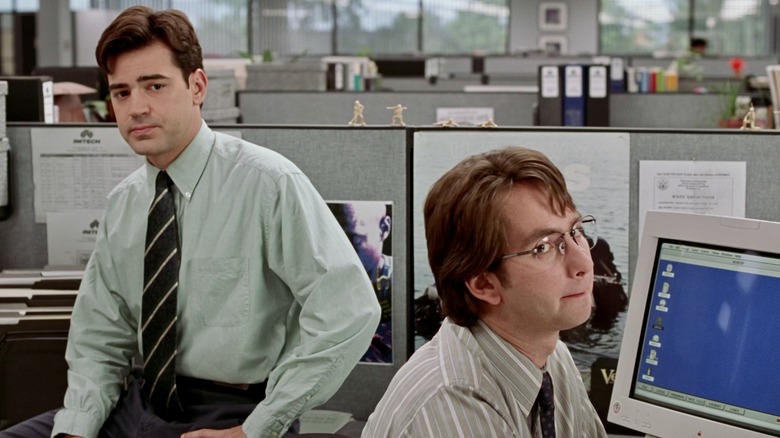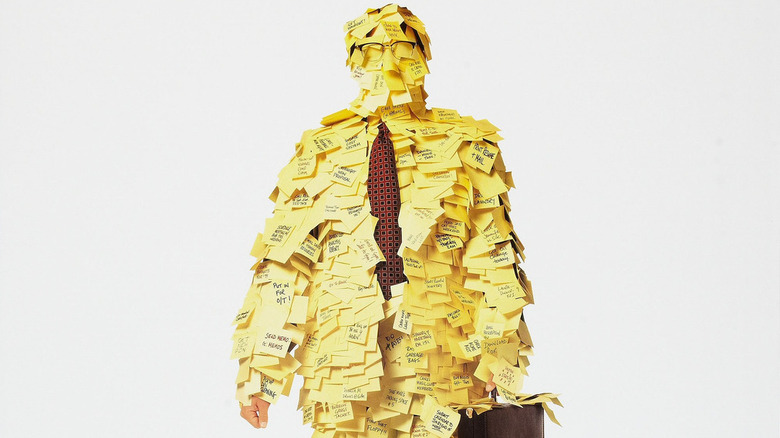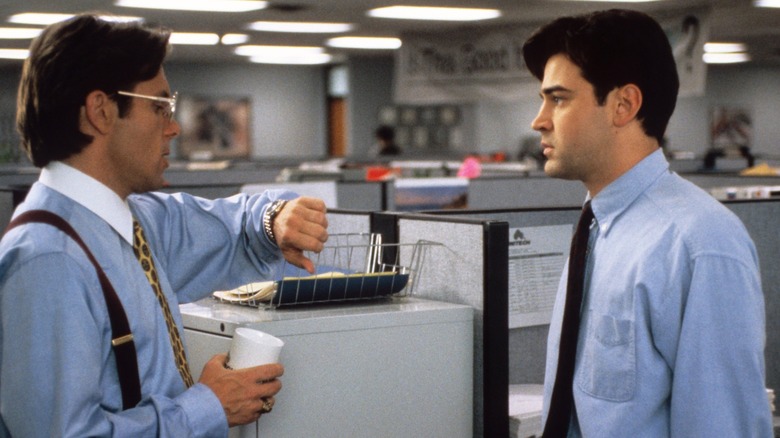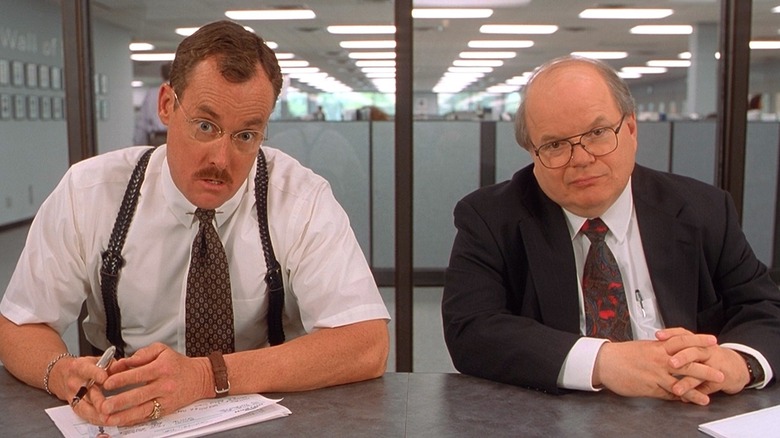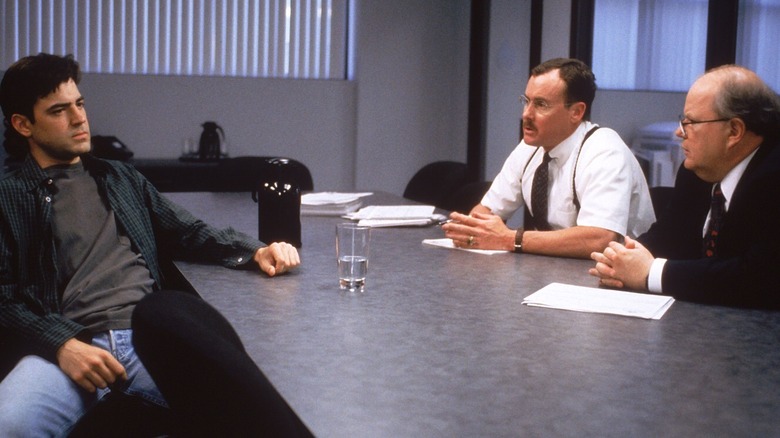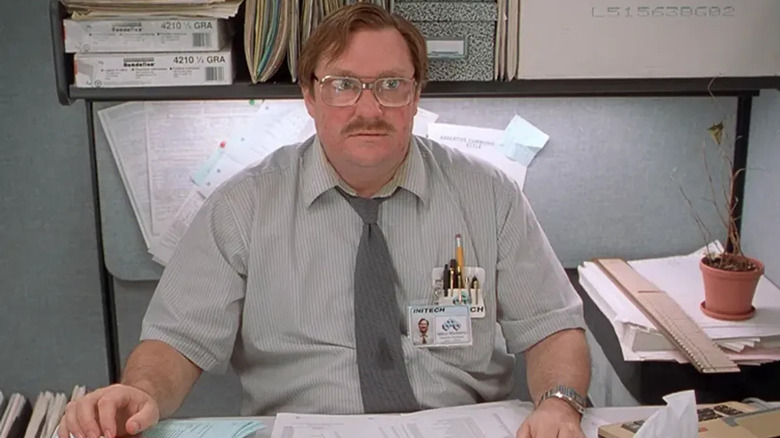Office Space Lacked Flair At The Box Office But Became A Cult Favorite
(Welcome to Tales from the Box Office, our column that examines box office miracles, disasters, and everything in between, as well as what we can learn from them.)
"I believe you have my stapler." Odds are, the majority of people who enjoy comedy films would be able to tell you that quote is from "Office Space." Directed by "Beavis and Butthead" creator Mike Judge, it was his first live-action feature and would probably rank near the top of any list of things he's made if one were to conduct an informal survey of his fans. That's the way it is now. In 1999 when the film first hit theaters? Not so much. "Office Space" majorly disappointed against high expectations and, at least at first, seemed like it was going to be forgotten to time. Then a straight-up cult developed around the workplace comedy and it's now a part of the fabric of popular culture.
The film centers on Peter (Ron Livingston), who hates his cubicle at his boring office job and, after an appointment with a hypnotherapist goes wrong, winds up adopting a carefree attitude towards his work. Instead of getting fired, he winds up promoted to upper management, only to discover that his friends are going to be laid off. So, they hatch a plan to embezzle a lot of money from the company, which goes sideways. Over-the-top though it may have been in many ways, it captured the mundanity of office life that so many Americans deal with and, once people caught on, it was impossible to ignore.
In this week's Tales from the Box Office, in honor of the 25th anniversary of "Office Space," we're looking back at Judge's revered comedy. We'll look at how it came to be, how the director wound up at odds with the studio over a number of key decisions, how the marketing failed the film, what happened when it finally hit theaters, and what lessons we can learn from it all these years later. Let's dig in, shall we?
The movie: Office Space
Before breaking into the entertainment business, specifically in the field of animation, Judge worked several mundane office jobs like so many of us. He also was, for a time, an engineer. Those jobs would ultimately go on to spark the idea for "Office Space," but before that he got the idea for the character of Milton, played by Stephen Root in the film. Judge ended up crafting a short film based on the character, animating it himself and voicing all of the characters.
The original "Milton" short was sold to Comedy Central in its early days as a network for $2,000 in the early '90s. That got Judge's career kickstarted and planted the seeds for what would become his first feature film. Several more of the shorts would later air on "Saturday Night Live." So, how did the movie come about, exactly? "The Aspen Comedy Festival played a bunch of my stuff, including my original animated shorts," Judge explained to The Ringer in 2019. "That's where [Fox Network president] Peter Chernin saw the Milton short ... and said, 'This should be a movie.'"
Judge didn't originally see a way to make an entire movie centered around that character in the shorts. The solution? Turn it into an ensemble workplace comedy. While that was an idea that the budding filmmaker was able to get his head around, it also meant adding another huge project to his already sizable workload.
"Fox said, 'What if it was a workplace comedy, like "Car Wash" and it's an ensemble?' Once they said that, then I said, 'I can do this myself and I'll try writing this.' I wrote up a treatment really early in 1996, turned it in to Fox, they really liked it a lot, and then I started one of the busiest years of my life where I was doing 'Beavis and Butt-Head [Do America],' then 'King of the Hill.' I started writing the screenplay the summer of 1997."
Fox thinks Office Space needs more flair
"Beavis and Butthead Do America" hit theaters in 1996, with "King of the Hill" premiering in 1997. Once that was up and running, Judge was able to dedicate himself more meaningfully to his live-action feature directorial debut. Filming took place in the summer of '98 but, before cameras could start rolling, the studio had to get a cast in place. Fox was very much hoping to get some A-listers in there, with Matt Damon and Ben Affleck eyed to star at one point, among many others.
"There was a lot of that — going out to big stars and coming back to me and saying, 'Sorry, [we] can't pay that kind of money.' Well, I didn't ask you to go out to him," Judge explained in that same Ringer piece. The studio did a table read at one point, and only two actors who were present at that read ended up in the final movie.
"We had a bunch of actors come in just to sort of see how it reads as a movie," Judge said. "The only ones who were actually in the movie were Stephen [Root] and David [Herman]." The character of Michael Bolton was played by Herman in the film, who perfectly encapsulated a disgruntled employee who is primarily mad about having the same name as an "assclown" who is a famous pop singer.
In the end, Judge filled out the ensemble with mostly under-the-radar character actors, with Ron Livingston ("Swingers") taking on the role of Peter. Gary Cole ("The Brady Bunch Movie") portrayed his overbearing boss Bill Lumbergh, and Diedrich Bader ("The Drew Carey Show") played his blue-collar neighbor Lawrence. Jennifer Aniston, who had recently broken out as a major star on "Friends," was arguably the biggest star in the film. She portrayed Joanna, a waitress at a kitschy restaurant named Chotchkie's who ends up dating Peter after he adopts his new carefree attitude.
20th Century Fox execs had a case of the Mondays
While Fox — or at least Chernin — had faith in the movie at first, things got contentious along the way. Judge explained in a 2009 interview that the studio didn't like the soundtrack, the casting, or "much of anything." He called it, at the time, "a movie that me and a couple of my friends and my brother would think is funny." In reflection, Judge believed much of that had to do with the fact that many of the high-ranking folks in Hollywood never had to engage much in the kind of work reflected in "Office Space."
"It kind of hit me at some point during the process that most people in the film business — not just the executives, the people who make them, too — tend to come from pretty upper-class backgrounds. If they go work a job, it's to have that experience, that sort of thing. After they graduate college, they have time to go visit Europe and take some time off and get their heads together."
Even getting product tie-ins proved to be difficult. In particular, securing a stapler company to provide Milton with his beloved red stapler was not easy, as several companies such as Boston and Bostitch didn't want to be in the movie. Swingline ultimately agreed but they didn't even have a red stapler in their line-up before the film.
The marketing also proved difficult and, again, contentious. The poster famously features a man covered in yellow sticky notes, which Judge was not a fan of. In 2019, the director explained that he didn't like the way Fox decided to make the film.
"I wasn't a fan of the marketing. We were polar opposite on everything. They sent me eight different cuts of the trailer. There were only two versions I absolutely hated, and those were their favorites. It was a very difficult movie to market."
The financial journey
Disagreements be damned, Fox released "Office Space" in theaters on February 19, 1999. In fairness, the studio did go pretty hard on the ad campaign and even got pretty creative. In a real-world marketing stunt, the studio had a man work in a see-through cubicle seventeen stories up in Times Square above a billboard that said "WORK SUCKS" for a couple of weeks. Unfortunately, the clever gimmicks didn't do much to move the needle for general moviegoers. The movie was dead on arrival.
Judge's comedy opened at number eight on the charts with a mere $4.2 million haul, losing badly to "Payback" ($10.2 million), which was already in its third weekend. It wasn't even the top choice among newcomers that weekend, with "October Sky" pulling in $5.9 million. The following weekend, it fell out of the top ten entirely with just $2.5 million and the writing was essentially on the wall. In mere weeks, the movie left theaters entirely to make way for bigger major hits such as "The Matrix," "10 Things I Hate About You," and "Never Been Kissed."
"Office Space" finished its run with just $10.8 million domestically and, eventually, pulled in a meager $1.3 million internationally, giving it a grand total of just $12.1 million. The movie only had a budget of around $10 million but, after factoring in the theater's cut of ticket sales and the marketing campaign, Fox was in the red on this one for sure. But '99 was a very different time and, fortunately, this movie would have a second shot at life in the years that followed.
Office Space gains a cult following
In the era before streaming took over our televisions, people had to resort to cable and video stores. Those secondary streams always provided something of a safety net for studios when a movie underperformed in theaters. In the case of "Office Space," Comedy Central, the same network that gave Judge his start by buying his "Milton" short, was a major factor in turning the tide for this movie.
"At some point, the movie got on Comedy Central, which played the hell out of it," Livingston said to Entertainment Weekly in 2019. "It felt like it kind of went viral before that concept even existed." Indeed, the movie became a hit for the network and they leaned into it, playing it frequently and opening it up to new viewers. The movie also did well on home video over time. An undeniable cult following had developed around this comedy that resonated with viewers. Judge explained to Variety in 2019 when he began to understand that the temperature had changed.
"I started hearing from the actors that they were getting recognized a lot. It was a slow build. Then around 2003, Fox wanted to do a sequel. If someone had told me that was going to happen on opening weekend in 1999, I would've thought they were just making fun of me."
A sequel never materialized, but the fact that those discussions even happened speaks volumes. Ajay Naidu, who plays Peter's pal Samir, explained in 2019 a very unique experience he had that cued him into the movie's loyal fanbase. "Years later I was in New York. Some Goodfella-looking guy says to me, 'We're huge fans. What you did with that printer was so authentic.' I think I got props from the mob," the actor said.
To top it all off, Swingline was met with such feverish demand for red staplers after the film came out that they created an official one after the film came out. It's now their most popular item.
The lessons contained within
In the streaming era, it is so very hard to imagine a movie like "Office Space" popping off like it did after flopping in theaters. Are cult classics even possible in the age of Netflix and streaming dominance? When things just get buried by the neverending deluge of content on our home screens, it's difficult to picture. Without a meaningful Blu-ray/DVD market and with the demise of cable TV, studios don't get second chances to recoup on a flop, and films don't get second chances to find their audience.
Beyond that though, this is a movie that may have ended up changing lives. As silly as that sounds, the comedy in the film was revealing to many who watched it. Livingston, in that same 2019 Variety piece, explained his experience in the years since the movie came out.
"People come and tell me that the movie changed their life. It's like after seeing the movie, it gave them the confidence to get out of whatever it was they were doing that was making them miserable and move on to something else. I only hear from the people for whom that worked out, but hopefully there's not too many that regret it."
Some of the changes were less obvious, though no less important for the people who benefited. "About four years after 'Office Space' came out, T.G.I. Friday's got rid of all that flair, because people would come in and make cracks about it," Judge said to Deadline in 2004. Much like Chotchkie's, these employees used to have to put silly flair on their uniforms. No longer. "Maybe I made the world a better place," Judge concluded.
Changing the world isn't always dramatic. Sometimes, it's just sparing customer service employees a little bit of grief. Not all heroes wear capes, and they don't rock flair either.
